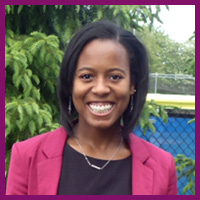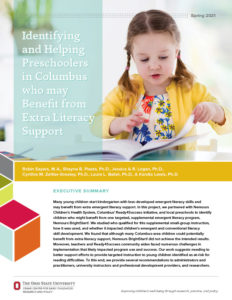About the Project
The BrightStart! project involved a collaboration with the Nemours Children’s Health System, Columbus’ Ready4Success initiative, and local early childhood programs to examine the efficacy of the Nemours® BrightStart! program (NBS!). This five-year randomized controlled trial was funded by the Institute of Education Sciences.
NBS! is a small-group, emergent literacy intervention that provides extra support for preschoolers who are at risk for later reading difficulties. Developed by a team at the Nemours Children’s Health System, NBS! was initially used in a community partnership with preschool programs in Jacksonville, Florida. Research conducted during this partnership showed that the intervention improved preschoolers’ emergent literacy skills. It is now commercially available to early childhood programs and educators.
In this research project, Crane researchers studied the commercially available version of NBS! as used in Columbus-area early childhood classrooms. The team partnered with Ready4Success who used an emergent literacy screener to identify eligible preschool children in each classroom. Some of these children were randomly selected to experience the NBS! lessons across their preschool year. For half of the selected children, the lessons were provided by their classroom teacher. For the other half, the lessons were provided by a Ready4Success member (“community aide”) who visited the classroom to deliver intervention. We measured all participating children’s literacy skills at the beginning and end of the preschool year and followed children as they matriculate through elementary school. Ultimately, this project determined whether NBS!, when carried out by teachers and community aides in typical early childhood classrooms, benefitted children’s early literacy learning and helped close reading achievement gaps.
To learn more about NBS!, visit the website or see the complete program here.
Publications
The most recent paper out of the Nemours BrightStart! (NBS!) project describes the patterns and predictors of intervention dosage in the preschool setting.
KEY TAKEAWAYS:
1. The number of intervention lessons experienced by children in schools was influenced by teacher and classroom factors (e.g. teachers’ self-efficacy, small-group size) much more so than child factors (e.g. attendance, social and behavioral skills).
2. Teachers who viewed the intervention lessons as more acceptable tended to provide more lessons. Likewise, teachers who were more self-efficacious (i.e., confident in their instructional and decision-making abilities) tended to provide more lessons.
3. The number of intervention lessons that children experienced was largely driven by when their instructors stopped offering lessons altogether. This therefore suggests the importance of monitoring whether intervention is ongoing and supports attending to ecological factors that may lead instructors to prematurely stop implementation.
This work has resulted in multiple peer-reviewed publications. To learn more, check out the published papers.
Latent Profile Moderation: Examining the Differential Impact of a Small-Group Emergent Literacy Intervention
This study examined preschool children identified as at-risk for later reading difficulties and different combinations of risk factors. They found that there were four different groups of children, based on cognitive, psychological, ecological, and child-replated factors. The researchers then examined the effects of the Nemours BrightStart! (NBS!) intervention on children’s emergent literacy skills and found that some groups responded better to the intervention than others. Specifically, the researchers found that NBS! was most effective for developing the letter-writing skills of children in one of the groups. These findings may help clarify for whom interventions are most effective.
Small-Group Emergent Literacy Intervention Dosage in Preschool: Patterns and Predictors
Intervention can positively impact children’s emergent literacy development, and dosage (amount of intervention experienced) is an important component for achieving impacts. In this study, Crane researchers observed teachers and community volunteers providing emergent literacy intervention in real preschool classrooms to identify teacher, classroom, and child factors associated with intervention dosage. Intervention dosage was mostly influenced by instructor and classroom factors rather than child factors. Intervention dosage was higher when (1) instructors felt that they could make a difference in children’s literacy learning, (2) instructors had more positive perspectives about the intervention, (3) small groups included fewer children, and (4) classroom teachers felt efficacious in instructional decision making.
Behavior Management and Engagement During Small-Group Instruction as Predictors of Preschoolers’ Literacy Skill Outcomes
Young children at-risk for literacy difficulties may not fully benefit from small-group literacy instruction if teachers have difficulty managing behaviors or if children are not engaged during instruction. The research team explored whether the collective behavioral engagement of small groups and teacher behavior management skills were related to preschooler’s early literacy gains. The findings indicate that when children in small groups are engaged during instruction, they are more likely to gain expressive vocabulary skills. This suggests that maintaining child engagement during lessons may enhance fundamental early literacy skills.
Small-Group, Emergent Literacy Intervention Under Two Implementation Models: Intent-to-Treat and Dosage Effects for Preschoolers At-Risk for Reading Difficulties
Supplemental, small-group emergent literacy intervention is a benefit for preschool-aged children identified as at risk for later reading difficulties. Crane researchers examine the effects of the Nemours BrightStart! (NBS!) intervention on children’s emergent literacy skills, when implemented by teachers and community aides in authentic preschool classrooms. Their findings have implications for revising the NBS! theory of change, conducting dosage and as-treated analyses, and moving research-based interventions toward scale-up.
The early writing skills of children identified as at-risk for literacy difficulties
Young children’s writing skills often receive less attention than their reading skills, and few early writing assessments are available. In this study, Crane researchers collaborated with Dr. Hope Gerde to examine the emergent writing skills of preschoolers identified as at-risk for later reading difficulties. The results showed that these children also had less-developed writing skills as compared to their peers and suggest that early writing differences can be identified through assessment. The findings indicate that early identification, and therefore intervention, is also possible for writing skills through literacy screenings.
Implementation of a small-group emergent literacy intervention by preschool teachers and community aides
Small-group emergent literacy interventions can boost early skills in preschoolers and set up a solid foundation for continued literacy learning. As these types of interventions are more and more available to preschool teachers, understanding whether they can be effectively implemented in typical classroom settings remains largely unknown. Crane researchers examined the Nemours® BrightStart! Program and its implementation in classroom settings. The findings have important implications for intervention development, use, and scalability.
Past research on NBS!
Read “Emergent Literacy Intervention for Prekindergarteners at Risk for Reading Failure” as published in the Journal of Learning Disabilities.
Read “Emergent Literacy Intervention for Prekindergarteners at Risk for Reading Failure: Years 2 and 3 of a Multiyear Study” as published in the Journal of Learning Disabilities.
Read “Efficacy of the Nemours® BrightStart! Early Literacy Program: Treatment Outcomes From a Randomized Trial With At-Risk Prekindergartners” as published in Early Education and Development.
Meet the Project Staff



Cindy Zettler-Greeley, PhD
Nemours® Partner

Laura Bailet, PhD
Nemours® Partner
Read more about Dr. Bailet here.

Kandia Lewis, PhD
Nemours® Partner
Read more about Dr. Lewis here.

Alida Hudson
Postdoctoral Researcher
The Ohio State University

Ye Shen
Dean’s Diversity Postdoctoral Fellow
The Ohio State University

Zhiling Shea
Postdoctoral Researcher
The Ohio State University
Additional Team Members
We would also like to recognize the work of our former doctoral students, Leiah Groom and Robin Sayers, project coordinator Dr. Naomi Schneider, and field assessors Caleb Stinson and Marilyn Rogers.
Thank You
Many thanks to Shelby Dowdy and the Ready4Success team!


